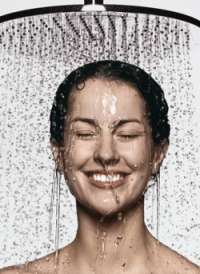
Electrical geysers are efficient water heaters, but they are totally reliant on electrical power. That means you will have a cold shower if there's a power outage. Electricity is already expensive and power costs are set to rise a total of 75% this year and over the following two years. Clearly, it's time to look for alternatives.
So what are your water heating options if you want to cut down your power bills and what are the pros and cons of each?
Gas geysers: They do not rely on electricity and can make hot water when there is a power failure. They are effective water heaters, but can be expensive to run because approximately half the energy goes up the chimney.
They have low maintenance costs. The installed price of gas geysers for an average home is approximately R12,500. The approximate life-span of a low quality system is two years and approximately 20 years for a high quality system.
There is no Eskom subsidy available for gas geysers. The cost to install an electric geyser for an average family of four is in the region of R7,500. The average life-span of an electrical geyser is five to 10 years.
Heat pumps: These can be effective water heaters, but they are totally dependent on electrical power - no power, no hot water. The most common heat pump installed in southern Africa is an air-to-water heat pump. This means the unit extracts the heat from the surrounding air, which results in the unit having to work excessively hard during the winter months due to the low temperature of the air around the heat pump. Obviously this will mean lower performances in winter.
They have many working parts, so they are susceptible to high maintenance costs. The approximate cost to install a heat pump for an average family is R13,500, excluding the cost of the geyser. They make excellent pool heaters where high volumes and low temperatures are required. There is no Eskom subsidy available for heat pumps.
Solar water heating systems: Solar systems are not dependent on electricity, but limited electrical input is required in winter. They are generally maintenance-free. The most popular size for the average home is a 300-litre system.
Solar is all about storing the solar heated water required by the family for a full day’s usage. The system costs approximately R22,000 in coastal areas and R26,000 in inland areas - the reason for the difference in price is that an indirect system needs to be installed inland so that the solar system is not damaged by freezing temperatures in frost-prone areas.
Eskom subsidies are available for these systems, and range from 30% to 40% of the purchase price, depending on which solar system is bought. The life-span on a high quality system is between 10 and 15 years.
Here are some pointers about how to choose the correct solar water heating system for your needs:
- Make sure that the solar company you choose has been in business longer than the guarantee they offer.
- Ask for references, preferably from a client who has had a system for five years or more.
- Ensure that your solar system of choice has the full SABS Mark of Approval. Ask to see a copy of the certificate verifying this mark. Many companies advertise that they have the mark, but only have an SABS Compliance Certificate. This is merely a once-off test on a single product and does not guarantee continued quality. All too often there are companies claiming they have the SABS mark when they are using a solar geyser with the mark and fitting it with a non-approved solar panel. Remember, the SABS mark is for the whole system and not just the component.
- Be wary of imported products. Foreign accolades are often meaningless in our harsh South African conditions. Many systems are designed for icy European conditions rather than Africa's scorching heat.
- A solar panel should not be fitted to an existing electric geyser. There are many reasons for this. The electric geyser is not as well insulated as a solar geyser and also, the storage volume is not big enough. An electric geyser will cycle its contents in approximately three hours, using the element to heat the water, while a solar geyser needs to store 24 hours of hot water for the whole family's daily needs. - Antonella Dési
Pictures courtesy of:
Hans Grohe: www.hansgrohe.co.za
Readers' Comments Have a comment about this article? Email us now.
FYI : In the section on heat pumps, the statement "extracts the heat from the surrounding air" is balderdash. Its like saying "let the car roll uphill". Heat can only move from areas with higher to areas with lower heat, until everything is the same temperature. Google "the 2nd law of thermodynamics" for confirmation... - Dean









